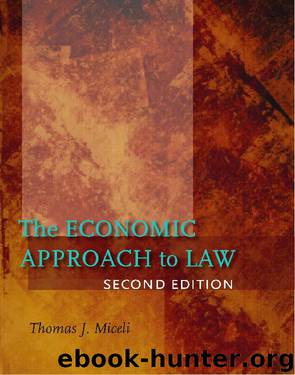The Economic Approach to Law, Second Edition by Thomas J. Miceli

Author:Thomas J. Miceli [Miceli, Thomas J.]
Language: eng
Format: mobi
Publisher: Stanford University Press
Published: 2008-08-04T04:00:00+00:00
1 Involuntary Transfers and Restrictions on Transfers Between Private Parties
This section examines coercive transfers, or restrictions on transfers, between private parties. The first two topics—adverse possession and mistaken improvement—concern the occupation or development of someone else’s property without their permission. The questions we address in these cases are: What is the appropriate legal remedy? and, Does it matter whether the encroacher acted intentionally or innocently?
We then turn to inheritance rules. Generally, property owners are free to bequeath their property as they see fit, a freedom consistent with the efficiency of voluntary exchange. There are, however, some restrictions on that freedom. We examine two: one that was historically important (primogeniture), and one that continues to be valid (the rule against perpetuities).
1.1 Adverse Possession
Adverse possession is a curious doctrine that on its face seems to legitimize the theft of land. Under the doctrine, the occupier of a piece of land who is not the true owner acquires title after a statutorily defined number of years if the occupation is hostile to the owner’s interests, open, and continuous. Further, the displaced owner cannot seek to recover the land, or even compensation, if he has failed to act within the statutory period. Thus, although adverse possession is an involuntary transfer of land, it is not a liability rule because of the absence of a right to compensation. Rather, it is a statute of limitation on the owner’s right to enforce a property rule.
Adverse possession represents a particularly severe challenge to the economic theory of law since it seems to undermine the very basis of market exchange—namely, secure property rights. Nevertheless, economists have formulated theories to explain the doctrine as a response to various forms of market failure.1
One common theory is that it deters owners from leaving their land idle. Economically speaking, this is not a good reason because irreversibilities in land development often make it optimal to wait until a future date to develop. Another reason is the standard argument for statutes of limitations: as time passes, memories fade and evidence becomes stale, making litigation over disputed title costlier.2 This argument is more plausible, but still it seems a frail reason for weakening a landowner’s rights, especially given modern methods of record keeping.
Download
This site does not store any files on its server. We only index and link to content provided by other sites. Please contact the content providers to delete copyright contents if any and email us, we'll remove relevant links or contents immediately.
International Integration of the Brazilian Economy by Elias C. Grivoyannis(111061)
The Radium Girls by Kate Moore(12030)
Turbulence by E. J. Noyes(8052)
Nudge - Improving Decisions about Health, Wealth, and Happiness by Thaler Sunstein(7709)
The Black Swan by Nassim Nicholas Taleb(7131)
Rich Dad Poor Dad by Robert T. Kiyosaki(6637)
Pioneering Portfolio Management by David F. Swensen(6302)
Man-made Catastrophes and Risk Information Concealment by Dmitry Chernov & Didier Sornette(6019)
Zero to One by Peter Thiel(5802)
Secrecy World by Jake Bernstein(4753)
Millionaire: The Philanderer, Gambler, and Duelist Who Invented Modern Finance by Janet Gleeson(4479)
The Age of Surveillance Capitalism by Shoshana Zuboff(4299)
Skin in the Game by Nassim Nicholas Taleb(4250)
The Money Culture by Michael Lewis(4209)
Bullshit Jobs by David Graeber(4192)
Skin in the Game: Hidden Asymmetries in Daily Life by Nassim Nicholas Taleb(4007)
The Dhandho Investor by Mohnish Pabrai(3767)
The Wisdom of Finance by Mihir Desai(3749)
Blockchain Basics by Daniel Drescher(3583)
